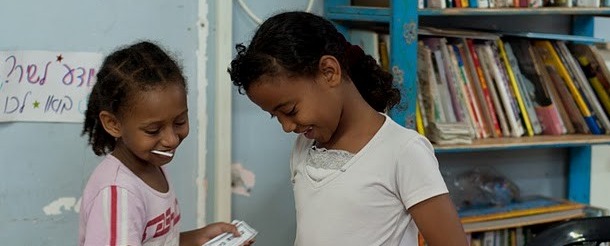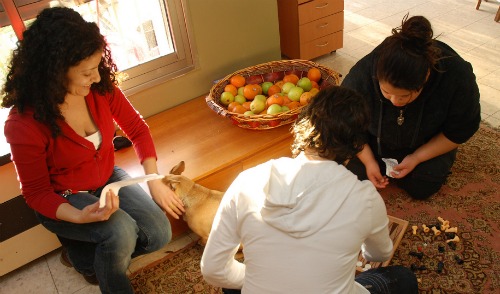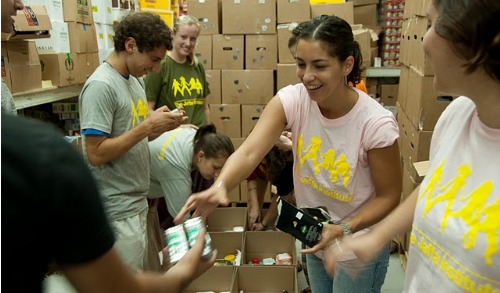‘We are an octopus,’ jokes one Jaffa Institute employee. ‘Whenever our founder hears of a problem, he extends another hand.’

If you randomly drive around the area where Jaffa, Tel Aviv, Bat Yam and Holon meet up, you will likely pass a few of the social welfare projects going on under the auspices of the Institute for the Advancement of Education in Jaffa, or the Jaffa Institute for short.
Established in 1982 by a Boston immigrant, this private non-profit agency started out with after-school activity centers to keep severely disadvantaged children off the streets and brighten their educational forecast.
Needy kids can’t learn if they’re hungry, and their parents can’t provide food if they’re unemployed. So the project has expanded to include holistic services focused on lifting families out of the cycle of poverty, malnutrition and other social ills. At the end of its third decade, it runs 30 initiatives including nine activity centers.
Heart and soul
“Everything is possible if you put your mind and heart and soul into it,” Jaffa Institute co-founder and chairman David Portowicz tells ISRAEL21c. He began the venture just after earning his Ph.D. from Brandeis University in social welfare. The late Zonik Shaham, his co-founder, brought in $60,000 in seed money from donors in Philadelphia.
“We’ve grown to a $7.5 million budget and from 25 kids to 4,000 kids. And if we can do 4,000, we can do 20,000,” says Portowicz. “There would no longer be a high dropout rate — 53 percent of teens drop out before 12th grade in these areas — or kids turning to drugs. It’s all a question of funding.”

“We are an octopus,” jokes Gil Sabo, manager of the Jaffa Institute’s food distribution venture, begun out of an awareness that many clients just don’t have enough to eat. “Whenever our founder hears of a problem, he extends another hand.”
The Israeli government provides 20 percent of the annual budget, supplemented by corporate and foundation grants and individual donations, nearly half of which now come from Israelis. A gala dinner April 5 in New York City is aimed at attracting additional American contributions.
In early February, Portowicz took a group of prospective donors from North America, France and the Netherlands to view projects including the recently enhanced Bet Shemesh Educational and Residential Center, a religious high school where 220 disadvantaged students are achieving matriculation results well above the national average.
Early this year, rap star Shyne announced that he will sponsor a mass bar mitzvah for Ethiopian boys at the center. Ethiopians comprise a quarter of the student body.
Ground will be broken in April for a therapeutic educational village for 200 at-risk teenage girls in Afula, and Portowicz is renovating a building in South Tel Aviv as a one-of-its-kind after-school center for learning-disabled youngsters.

“Most of our kids are just lacking money, motivation and stimulation, but these kids are left out of other after-school programs because nobody else serves this population,” says Portowicz.
Extending many hands
Each year, Sabo’s operation is aided by 1,000 volunteers from corporations and tourist groups — even a Muslim group from Turkey participated not long ago. They pack and schlep in a warehouse piled with carefully organized edibles rescued, purchased or donated by other organizations and by manufacturers such as Kellogg’s. The Dan bus company lends a vehicle to help distribute whatever won’t fit in volunteers’ cars.
Twice a month, 20-kilo unmarked boxes go out to at least 350 Israeli families recommended by the Ministry of Welfare, and 80 Holocaust survivors get monthly deliveries. Before Passover and Rosh Hashanah, the number swells to 1,500. These are not only Jewish families, however. “Children are children and everyone gets the same box,” says Sabo.
“We are trying to break the cycle of poverty and help them progress, to stop hunger from keeping the kids from excelling in school and the adults from going out to work,” explains Sharon Berkley, a Jaffa Institute spokeswoman.
Another “tentacle,” a job-training program called Welfare to Wellbeing, addresses the latter situation. Most participants are single mothers, like the two who are now paid by the Institute to prepare 1,000 nutritious sandwiches every morning for needy kids at eight area schools in partnership with Leket Israel.
Hope for at-risk teens
Berkley took ISRAEL21c to visit Beit Ruth, a rehabilitative residence in suburban Rishon Lezion for 13 girls aged 14 to 18 from abusive or neglectful backgrounds. Each girl stays at least a year in this family-like environment, getting therapy, in-house schooling and a host of physical and creative activities.
“Beit Ruth helps them overcome the traumas they’ve been through and helps them gain enough confidence to realize they can still have ambitions and dreams,” says house director Ronit Lev Ari. “We give scholarships to girls who want to go on to higher education.”
In the four years Beit Ruth has been operating, many of its residents have received high school diplomas and three have gone on to the army, which is normally reluctant to accept soldiers with a troubled past.
Beit Ruth is the model for the much bigger government-supported village planned in Afula in partnership with the Women’s International Zionist Organization.
A sense of family
Ten children from six to 12 years old are housed at Neve Ofer House, the Jaffa Institute’s emergency refuge in South Tel Aviv for children unlikely ever to return to their dysfunctional birth homes. They’re cared for family-style by a house mother and father who live there with their own three children.
“The father went to our boarding school in Bet Shemesh, and the mother met him while doing her National Service there,” relates Berkley. The couple is aided by National Service women and paid staffers. The kids receive a range of therapies, and parents may visit once a week under supervision.
The 60 children who flock every day – even on school holidays and summers — to the Jaffa Institute’s original after-school center in Jaffa are in a better situation. Here, Arab and Jewish children referred by social services may stay until 6pm to enjoy activities in art, music, sports and nutrition, plus violence- and drug-prevention workshops. In the evenings there are parent programs.
“Without these centers, the kids would be going back to homes where they are unsupervised and have no appropriate role models,” says Berkley. “The main emphasis is that they get a hot meal and one-on-one help with their homework. If you can help the kids to succeed at school, then the next generation will be in a much better position. And there are some really nice stories of what they’ve gone on to become.”













